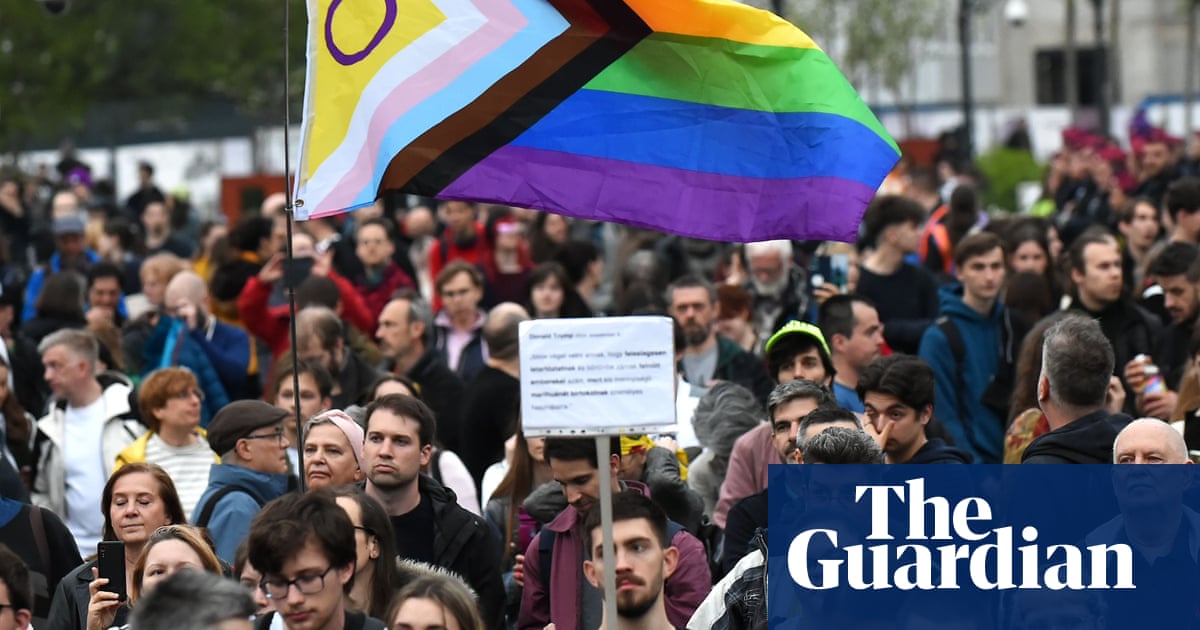Far-right politicians in Europe are weaponising LGBTQ+ rights and sowing divisions that are sending hate crimes soaring, campaigners have said as communities prepare to mark Pride month.
For years, countries inEuropewere among those at the forefront of advancing rights, making steady progress on issues such as marriage equality, said Katrin Hugendubel of ILGA-Europe, an umbrella organisation that works with more than 700 groups across Europe and central Asia.
In recent years, however, there has been a sharp reversal. “Not only is there a real non-advancement in legal protection, but laws are actually being taken away,” said Hugendubel. “And what we see is that, more and more, laws are being designed not to protect the fundamental rights of people nor to address any genuine societal needs, but purely to marginalise the community.”
Examples span Europe. InHungaryandSlovakia,populist governments have sought to enshrine two genders in the constitution, a promise echoed by the far-right Austrian partythat wonthe most votes in the last election. In at least 10 European countries,includingItaly, Bulgaria and Romania, attempts have been made to introduce legislation barring LGBTQ+ topics from schools.
This week, the Council of Europesaidtransphobic hate speech was rife in many European countries, with references to protecting children against “gender ideology” becoming what it described as a “recurring trend”. Earlier this year, Hungarybecame the firstcountry in the EU to ban events involving the LGBTQ+ community, in alegal changethat was codified just as Budapest Pride was preparing to mark its 30th year.
Politicians themselves have used parliament, political rallies and media interviews to take aim at the community, fuelling anti-LGBTQ+ sentiment and normalising discrimination across the continent.
The impacts had been wide-reaching, Hugendubel said. “It’s leading to more hate online and offline, and that’s leading to increasing violence.”
A2024 surveyof more than 100,000 LGBTIQ people in 30 European countries found that reports of violence and harassment had reached new highs, with 14% of respondents saying they had been physically or sexually attacked in the five years prior to the survey. One in three said they had faced violence repeatedly.
The findings highlighted how bullying, harassment and violence remained constant threats, said Sirpa Rautio, the director of the EU’s Fundamental Rights Agency, which carried out the survey. “Being openly LGBTIQ in Europe should not be a struggle,” Rautiosaid in a statement.
While the rollback of rights has been most intense in central and eastern Europe, where rightwing politicians are gaining power, violence is rising across the continent, with countries includingFrance,Germany,BelgiumandSpainall reporting surges.
Sign up toThis is Europe
The most pressing stories and debates for Europeans – from identity to economics to the environment
after newsletter promotion
Suicide rates has also risen amid the growing climate of discrimination, Hugendubel said, particularly in the trans community. “This kind of ongoing war that’s being waged against trans people is hitting very vulnerable young people who are trying to work out their gender identity, trying to find their space in society. The relentless hostility can have devastating effects on mental health, including increased risks of suicide,” she said. “It’s often forgotten, but that’s part of the story of the rise in hate as well.”
She described the erosion of LGBTQ+ rights as a “canary in the mine”, as the same far-right governments go on to extend their attacks to academics, journalists and artists and undermine fair elections. “The community has been weaponised,” she said. “You’re scapegoating a community and you use that to create an us-against-them narrative to bind you to your own voters and build alliances that safeguard your own power.”
The trans community had borne the brunt of this tactic as politicians seized on the fact that many people knew little about the community or trans rights, Hugendubel said. “It was an easy entry point to sow fear among people, to sow division,” she said. “So in that sense, it was a real instrumentalisation. You kind of take the weakest link and enter there to sow fears, to sow misinformation that then goes into broader attacks against the community, but also against human rights standards.”
What had emerged was an “existential threat” for democracy, one that had made it imperative for the EU to take action to address the violation of fundamental rights, she said.
In recent days, pressure has been growing on the EU to address the Hungarian government’s Pride ban, with 17 countriescalling on Brusselsto use all the legal tools at its disposal if Hungary does not revise the measures. So far, however, there has beenlittle responsefrom the upper echelons of the EU.
As organisations across Europe geared up to markPride, all of this was weighing heavily on many, she said. “We’ve always said that Pride is a protest. In many countries with LGBTI rights advancing, Pride has luckily turned into a big celebration and a celebration of diversity in the community, which it should be as well.”
But its roots in protest could not be forgotten, she said, particularly at a time when communities were grappling with scapegoating, hate speech and surging violence. “In the end, limiting Pride is not just limiting the visibility of LGBTI rights. It’s really limiting the freedom of assembly that every citizen has,” she said. “And I think this Pride season will be a stark reminder of that.”
In the UK and Ireland,Samaritanscan be contacted on freephone 116 123, or emailjo@samaritans.orgorjo@samaritans.ie. In the US, you can call or text theNational Suicide Prevention Lifelineon 988, chat on988lifeline.org, ortext HOMEto 741741 to connect with a crisis counselor. In Australia, the crisis support serviceLifelineis 13 11 14. Other international helplines can be found atbefrienders.org
